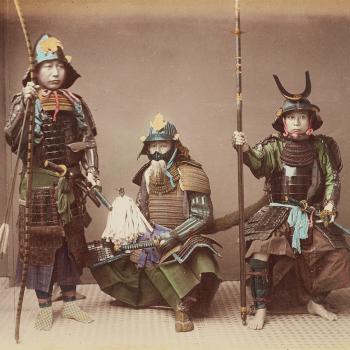Some idiot shoots a gun into the air, and someone a mile away is hit by the falling bullet. But that’s karma too.
A lot of people have been talking about “karma” the past week, since President Trump — widely held to have been negligent in his handling of the COVID-19 pandemic — was diagnosed with the disease.
Most literally the word “karma” comes from a root meaning “work” or “deed”, and seems to have expanded to take on the additional connotation of the intention that sets a deed in motion and the consequences that flow from it.
There are many different interpretations in different schools of Buddhism and Hinduism. A lot of people, especially in Western pop culture but in the East as well, think of karma as some sort of “just desserts”.
But a more sophisticated interpretation might be “cause and effect”.
As the Tibetan Buddhist teacher Khandro Rinpoche put it, “We do not believe in a creator but in the causes and conditions that create certain circumstances that then come to fruition. This is called karma. It has nothing to do with judgement; there is no one keeping track of our karma and sending us up above or down below. Karma is simply the wholeness of a cause, or first action, and its effect, or fruition, which then becomes another cause. In fact, one karmic cause can have many fruitions, all of which can cause thousands more creations.”
Now, if something good happens to us, it is very gratifying to think that it is the effect caused by our own good work. And if something bad happens to someone else, it is comforting to think that it is their fault. If bad things happen to good people (not to mention so-so people like most of us), then they might happen to me!
Much more pleasant to believe that life is ultimately fair — whether because of a divine judge doling out rewards and punishments or because the mechanical working of cosmic spiritual forces. That we’re safe from bad things happening and have earned the good things. At least…it’s more pleasant up until the bad things happen.
It’s Not Fair
But causality isn’t personal like that. The results of actions often fall on people other than the actor. Some idiot shoots a gun into the air, and someone a mile away is hit by the falling bullet.

There’s an old George Carlin routine where he says that farts eventually float up to a layer of the atmosphere just above the ozone layer, and if the ozone layer were destroyed they would fall back to Earth…and not necessarily onto their original owners. Thus it is with the consequences of all our deeds.
But there are reasons that the spiritual traditions that have achieved power in the world portray karma as personalized. It’s useful for getting people to behave — the most juvenile form of religious ethics, the threat and promise that the gods or the workings of cosmic forces will give you candy if you’re good and a spanking if you’re bad.
And if you are born into a privileged place in society — a aristocratic or priestly caste — and the proles start talking about the system being unfair and how maybe it ought to be overthrown by revolution, it’s useful to have the justification that your current position isn’t just the result of luck but is the workings of cosmic justice.
If you can convince the proles that your privilege is the result of merit accumulated in past lives, then you can get them to believe that if they live lives of virtue — including following the instructions of the priests — they can be born into the privileged castes next time around. But if they try to upset the system, they’re sure to be reborn into the Region of Thud.
Transpersonal Karma
So there are low-level, power-political motives to pretend that karma is a matter of justice. We ought to reject those motives.
But there is something deeper. From a transpersonal point of view, from the experience of the mystic, from the perspective of what the Buddhists call anatman, “no self”, when “you” perform an action and “someone else” suffers the consequences, that “someone else” is not different than “you”.
Many years ago I printed out a quote from Diane Duane’s Star Trek novel Spock’s World and taped it on my apartment wall. In the novel it was attributed to the great Vulcan philosopher Surak:
The spear in the Other’s heart
is the spear in your own:
you are he.There is no other wisdom,
and no other hope for us
but that we grow wise.
Or as another old George Carlin routine put it, “Most of the major religions have said, ‘Love your God, love your neighbor, love your self.’ And then without saying it they meant, ‘Because basically it’s the same guy.'”.
Or as that old Zen Pagan John Lennon put it, “I am he as you are he as you are me and we are all together”.
Of course that’s a hard thing to see moment to moment. And it’s not appropriate in every situation. Sure, we’re the same, but if you go to the bank and pretend to be me it’s identity fraud. So let’s be clear that context matters when we’re talking about these ideas.
But from that transpersonal perspective of “you are he”, “you’re all the same guy”, “we are all together”, justice is a different matter. It gets interesting when the victim and the perpetrator are not-two.
Because you’re just not-two with Jesus and the Buddha, not just with people you love. You are not-two with strangers, with people who annoy you, with the bully who beat you up in fifth grade.
You’re even not-two with Donald Trump.
That’s a difficult truth to wrestle with! But it’s a much more worthy foundation for ethics than the candy-or-spanking approach.
From that perspective, the karma of an action isn’t “fair” or “unfair”, any more than the way the Earth orbits the sun or neutrons decay into protons and electrons is fair or unfair.
But it does come back to “you”, even if it’s coming back to different parts of “you”. Thus we would want to choose actions whose effects are good for all those different parts of “us”.

















